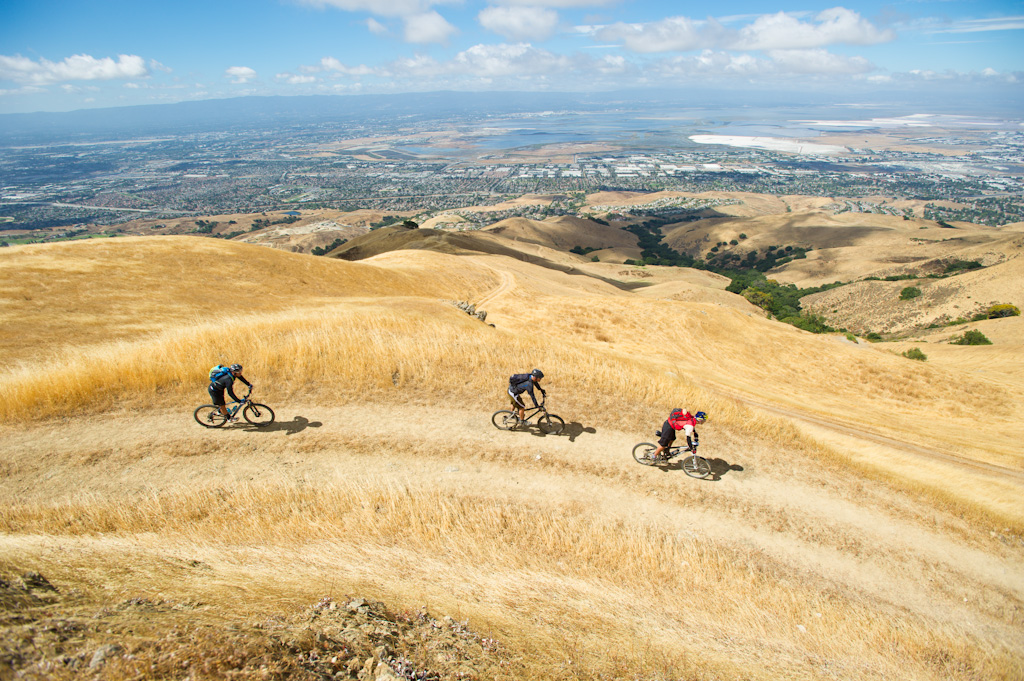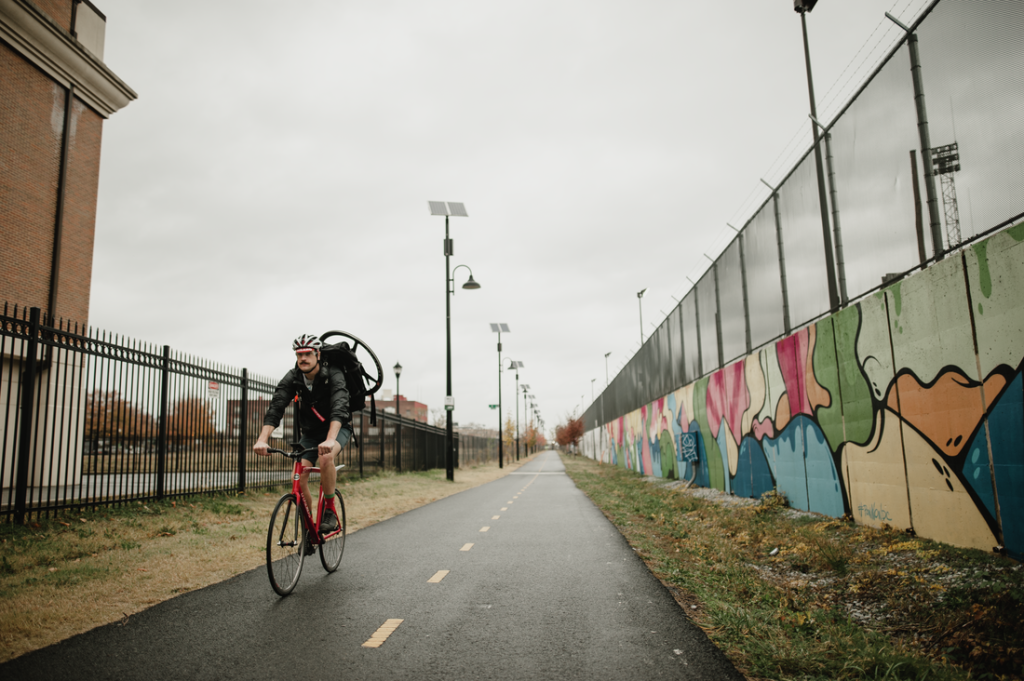As a co-op, we’re a different kind of company. We put purpose before profits and act with the long-term interests of our members in mind. Being a co-op also means we act transparently. That’s why we publish our annual Stewardship Report. It’s our way to show what we did in the previous year to get more people outside, operate more sustainably, and protect and create access to our outdoor places–none of which we could have done without you.
“What if we reimagined how people connect to the outdoors in cities, and how the outdoors connects to cities?” challenges Kristen Ragain, philanthropy and community partnership manager for REI. Over the course of the past several years, this question has inspired a new line of community investment and partnering by REI—what we call our Rewilding Projects.
At REI, we’re on a mission to ensure every American can have the same transformational experiences in the outdoors that we die-hard outdoorists love. Of course, we do that through gear, classes and REI Adventures trips. But we also do it through co-op philanthropy, which is substantial for a company of our size and scope. In 2018 alone, we’ll invest approximately $8.8 million in projects, outdoor places and organizations that are increasing access to the outdoors. “With almost 80 percent of the United States population living in urban areas—and the fact that the average American spends 95 percent of their life indoors—we decided it was the time to rewild cities,” Ragain added.
Three years ago, we launched the first of our Rewilding Projects, part of our long-term strategy to help provide millions of people easier access to nearby outdoor places. The goal is to reshape how people in large urban and suburban areas connect with the outdoors. Rewilding investments are a logical progression from other REI community investments. They’re bigger, broader geographically and longer in scope.

Bikers on the Bay Area Ridge Trail Ride. (Photo Credit: Scott Markewitz)
Over the course of the 20th century and continuing into this one, Americans gradually have been spending more and more of their days indoors. REI wants to help reverse that trend. These impact investments are about integrating the outdoors into people’s daily lives—meeting them where they live, work and play. As we began to explore this idea, five regional projects quickly presented themselves as exciting rewilding opportunities:
- Accelerating efforts to complete the 550-mile Bay Area Ridge Trail (370 miles are complete), which surrounds 8 million people in the San Francisco Bay Area.
- Improving access to and enhancing outdoor recreation infrastructure at the San Gabriel Mountains National Monument, which is located within an hour’s drive for 10 million people in the greater Los Angeles area.
- Reimagining Southeast Chicago as an outdoor recreation hub just 25 minutes from the urban core, with a mountain bike park, trails, paddling, climbing and more.
- Creating a world-class network of multi-use trails that are equitably distributed throughout the Washington, D.C., metropolitan region providing healthy, low-stress access to open space and reliable transportation for people of all ages and abilities.
- Restoring and improving access to the Middle Fork Snoqualmie area near Seattle, the 15th largest metropolitan statistical area in the nation.

Cyclist in D.C.
These projects involve many partners, stakeholders and funders. Using a combination of grants, relationships and expertise, we learned how REI can be uniquely positioned to support each project—such as when our marketing team helped redesign the Bay Area Ridge Trail brand and logo. Our support for these projects ranges from making an organization stronger all the way to constructing outdoor recreation infrastructure. And these are the results so far:
San Francisco
Taking one nonprofit to the next level
This 550-mile-long multi-use trail—of which 375 miles are currently open—traces the ridgelines ringing San Francisco Bay and serves 8 million people through nine counties, from Mount St. Helena to south of San Jose. REI’s investment supported the construction of new portions of the trail while simultaneously strengthening our decade-plus partner, Bay Area Ridge Trail Council, through trail and organization rebranding, a website rebuild, convenings, awareness campaign and a database system for communications and funding. All of this contributed to more donors, more funding, increased web traffic and better staff efficiency—which translated into more resources to finish the trail.
Los Angeles
Providing access to the San Gabriel Mountains
The San Gabriel Mountains National Monument serves as the backyard to the nation’s second largest urban center. Thousands of miles of streams, trails and other recreational opportunities lie within one hour of the nearly 10 million people who live in Los Angeles County. Through the Rewilding Project, REI has collaborated closely with the National Forest Foundation and The Wilderness Society to restore and reroute trails, enhance recreation infrastructure and increase access by linking urban trails and developing public transportation from the city to the mountains.
Chicago
Building world-class recreation within city limits
We partnered with the Chicago Parks Foundation, Active Transportation Alliance and Friends of Big Marsh to transform industrial dumping grounds into an outdoor hub in the Southeast side of Chicago. One of the initial projects is the completion of an incredible mountain bike park surrounded by trails for hiking and space for restored ecology. We’ve also supported these community-led organizations by rebranding and building awareness of the new outdoor recreation opportunities, advocating for new transportation options to help Chicagoans get to what will one day be multiple connected parks and trails, and developing the Big Marsh property into mixed-use trails and one of the biggest mountain bike parks in the country. “The main thing that’s important to understand is the relationship between outdoor recreation and ecology. The big story at Big Marsh is how the two have gone hand in hand,” said Randy Neufeld, director of the SRAM Cycling Fund, one of our partners for the project. “The space that was ruined by old industrial activities is being restored, because it’s providing recreational opportunities.”
Washington, D.C.
Connecting a network of city trails
In D.C., we supported the creation of the Capital Trails Coalition with a $500,000 grant over four years, and worked directly with Washington Area Bicyclist Association, Rails to Trails Conservancy and the Trust for Public Land to help create a world-class network of over 600 miles of multiuse trails that are equitably distributed throughout the Washington, D.C., metropolitan region. Like all of the Rewilding Projects, we served as convener—supporting meetings of a diverse array of stakeholders, in both the public and private sectors, to come together, develop a shared vision and create a high functioning coalition that will connect the region’s trail network. The coalition has spurred conversations about what it means to have a world-class trail network and has raised the priority of trail development with in D.C. region. “Good jobs in D.C. typically take an hour and a half for my residents to reach via public transit,” says Robert Looper, Ward 5 advisory neighborhood commissioner, “and when this work is realized they’ll just hop on their bikes to get there. I want to make sure the city recognizes that this is not just about building infrastructure, but that it affects people’s lives and how they get around.”
Seattle
Connecting urbanites to open green spaces
One projects is underway in Seattle. This project seeks to restore and improve access to the Middle Fork Snoqualmie area. This wilderness playground is 20 miles from Seattle, the 15th largest metropolitan statistical area in the nation. Few other major population centers stand so close to such vast, accessible, public natural lands. We are partnering with Mountains to Sound Greenway Trust to help chart a sustainable future for the Middle Fork, not only by building trails and facilities, but by forging a new model for locally driven, cooperative land management.
Tell us how you want to see your city rewilded in the comments below.


